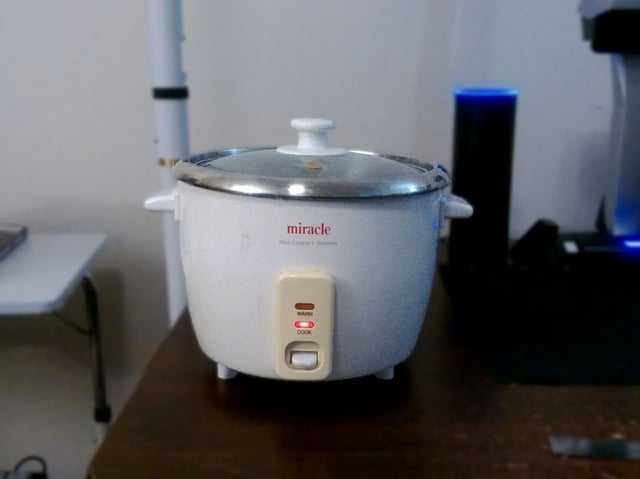Yes, you can use a rice cooker in your room, but it’s important to consider safety and practicality. While it’s convenient for quick meals, using appliances like a rice cooker indoors can pose fire hazards or generate excess heat if not used properly. Always ensure proper ventilation, avoid leaving it unattended, and keep it away from flammable materials.
Using a rice cooker in your room is possible, but it’s not always the safest choice without proper precautions. It’s best suited for well-ventilated areas like kitchens. If you decide to use it in your room, take safety seriously—plug it into a grounded outlet, don’t leave it unattended, and keep a fire extinguisher nearby. Think about the risks and benefits carefully before plugging in your rice cooker for a quick snack late at night.
Can I use a rice cooker in the room?
Is It Safe to Use a Rice Cooker Inside Your Room?
Using a rice cooker in your room might seem convenient, but safety should always come first. Rice cookers are electrical appliances that generate heat and steam, which can pose fire risks if not used properly. Ensuring proper safety measures can help you enjoy your rice cooker without worry.
Potential Fire Hazards
A common concern with using a rice cooker in a room is the risk of fire. Overheating or leaving the appliance unattended can lead to electrical fires. It’s important to keep the rice cooker on a flat, heat-resistant surface away from flammable materials such as curtains or paper.
Ventilation and Steam Accumulation
Rice cookers emit steam during operation, which can cause humidity buildup. In a small, enclosed space, this moisture might lead to mold or damage to your belongings. Good ventilation helps minimize this issue and maintains air quality.
Electrical Considerations for Room Use
Before plugging in your rice cooker in your room, check your electrical setup. Many rooms do not have the same outlets or power capacity as kitchens.
Power Supply Capacity
Most rice cookers require a standard 120V outlet with a power range of 300 to 700 watts. Ensure your room’s outlet can handle this load without tripping the circuit. Overloading can cause electrical shorts or fires.
Extension Cords and Safety
If you need to use an extension cord, choose one that is rated for high power appliances. Avoid daisy-chaining multiple cords, which can increase the risk of overheating and electrical failure.
Heat and Humidity Management
Using a rice cooker generates heat and moisture, impacting room conditions.
Heat Generation and Room Temperature
A rice cooker can raise the temperature in your room slightly while in use. This might not be ideal in hot weather or small spaces, contributing to discomfort or increased cooling costs.
Humidity Levels and Mold Risks
Steam released during cooking raises humidity levels, which can lead to dampness or mold if not properly ventilated. Using a small fan or keeping a window open can help reduce moisture buildup.
Noise Levels and Distraction
Rice cookers make noise during operation, usually a bubbling or boiling sound. In a quiet room, this might become distracting, especially when trying to sleep or concentrate.
Operational Noise
Most rice cookers operate quietly, but some models with loud alarms or fans can be disruptive. Consider choosing a quieter model for room use.
Timing and Sleep Considerations
If you plan to cook overnight, be aware of the noise level. Some rice cookers have timers or keep-warm features that allow you to plan cooking times without disturbance.
Practical Tips for Using a Rice Cooker in Your Room
If you decide to use a rice cooker in your room, follow these safety and convenience tips.
Placement Matters
Place your rice cooker on a flat, stable surface away from curtains, furniture, or other flammable items. Use a heat-resistant mat underneath.
Ensure Proper Ventilation
Open a window or use a small fan to circulate air and disperse steam. This reduces humidity levels and prevents moisture-related issues.
Monitor While Cooking
Never leave the rice cooker unattended. Keep an eye on it to prevent overheating or spills.
Keep Devices Away from Water
Avoid placing the rice cooker near sinks or humid areas to minimize electrical hazards and damage.
Alternative Solutions for Room Use
If using a rice cooker in your room raises concerns, consider these alternatives.
Portable Mini-Rice Cookers
Small, portable devices designed specifically for personal use often have lower power consumption and safety features suitable for room use.
Microwave Cooking
Microwave ovens can cook rice effectively and are often safer for indoor use when ventilation is limited.
Pre-Cooked or Instant Rice
Using pre-cooked rice that only needs reheating minimizes the need for active cooking in your room.
Shared Kitchen Space
Using communal kitchen facilities for cooking ensures safety and proper ventilation, preventing damage to your room.
Legal and Building Regulations
Check your accommodation’s rules regarding electrical appliance use.
Apartment or Dorm Rules
Some buildings prohibit cooking devices in rooms for safety reasons. Always review your lease or dormitory policies before using a rice cooker.
Insurance and Liability
Using electrical appliances improperly can void insurance policies. Follow all safety guidelines to protect yourself and your belongings.
Final Thoughts on Using a Rice Cooker in Your Room
While it is technically possible to use a rice cooker in your room, it requires careful attention to safety. Proper placement, ventilation, and monitoring are essential to prevent hazards. For regular or extended use, exploring safer alternatives or designated cooking areas might be a better choice. Always prioritize your safety and follow your building’s regulations to enjoy your cooking experience without trouble.
Cook Rice The Quick & Easy Way With This Aroma Rice Cooker
Frequently Asked Questions
Is it safe to keep a rice cooker in a hotel room or rented accommodation?
While using a rice cooker in a hotel room or rented space might seem convenient, it’s important to consider safety and hotel policies. Many accommodations restrict the use of small electrical appliances to prevent fire hazards. Always check with the management before plugging in any appliance. If permitted, ensure the cooker is placed on a stable, heat-resistant surface and operated away from curtains or other combustibles. Never leave the appliance unattended while in use.
Can I use a rice cooker for other cooking tasks in my room?
Yes, a rice cooker can be used for various cooking activities such as steaming vegetables, cooking oatmeal, or even preparing soups. Modern rice cookers often have multiple functions, making them versatile for preparing different meals. Just make sure to follow the manufacturer’s instructions and avoid overloading the cooker to prevent spills or malfunctions. Proper ventilation is also important to avoid excess steam buildup in small spaces.
What are the potential risks of using a rice cooker indoors?
Using a rice cooker indoors carries some risks if safety measures are not followed. These include electrical hazards, fire risks from overheating, and excess moisture leading to damage or mold. To minimize these dangers, always place the cooker on a flat, heat-resistant surface, keep the area dry, and never leave it unattended. Additionally, make sure the appliance is in good condition and unplugged after use.
Could using a rice cooker in my room cause issues with electricity or power outlets?
Using a rice cooker may draw more power than some outlets in your room can safely handle. Check your room’s electrical capacity and the wattage of your rice cooker before plugging it in. Overloading outlets can cause tripping breakers or damage to the electrical system. To prevent this, avoid using multiple high-power appliances simultaneously and consider plugging the cooker directly into a wall socket rather than power strips.
Are there any alternatives to using a rice cooker in limited spaces?
If space or safety concerns prevent you from using a rice cooker, consider alternatives like microwave steaming or portable electric cookers designed for small spaces. Some hotels or accommodations provide communal kitchen facilities that you can use, reducing the need to operate appliances in your room. Always prioritize safety and check the available amenities or permissions before cooking in your room.
Final Thoughts
Using a rice cooker in your room can be convenient, especially when you want quick meals. However, safety and ventilation are key considerations to prevent accidents or fire hazards. Always ensure the room is well-ventilated to avoid excess steam or heat buildup.
In conclusion, can I use a rice cooker in the room? It is possible, but prioritize safety and proper ventilation. Use it responsibly to enjoy your meals without risking safety or comfort.
As an Amazon Associate, We earn from qualifying purchases. When you purchase a product through Amazon links on kitchenadvising.com, we may earn a small commission at no extra cost to you. This helps support the site and keep our content free.


